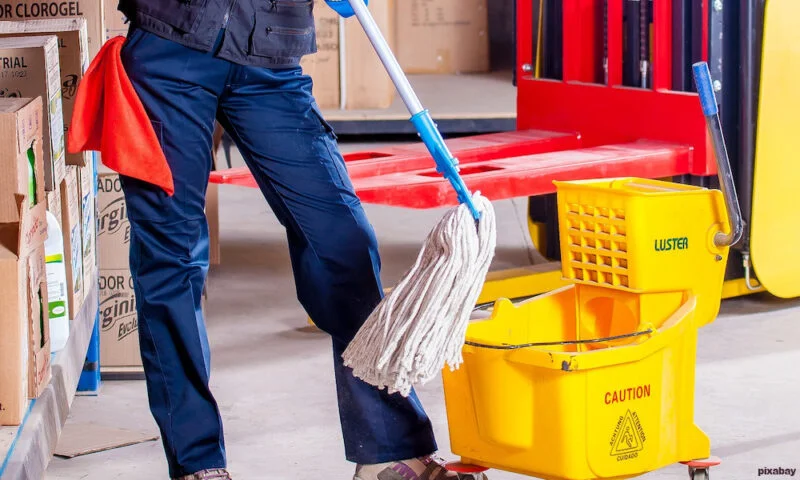Cleaning Business for Dummies: A Step-by-Step Guide
Welcome to the world of cleaning business for dummies. If you’ve ever dreamed of starting your own business but weren’t sure where to begin, or if you’re already in the cleaning industry but seeking guidance on how to take your venture to the next level, you’ve come to the right place.
This comprehensive guide is designed to demystify the process of launching, running, and growing a successful cleaning business, even if you’re a complete novice.
Cleaning businesses have become a ubiquitous part of modern life, from residential cleaning services that keep our homes sparkling to commercial cleaning companies that maintain the hygiene and appearance of offices, medical facilities, and retail spaces.
The demand for professional cleaning services continues to grow, making it an attractive industry for aspiring entrepreneurs.
We will go through the step-by-step roadmap to navigate the intricacies of the cleaning business. We’ll cover everything from the initial planning stages and setting up your business to managing day-to-day operations, marketing your services effectively, and scaling your enterprise for long-term success.
Whether you’re a dummy in the world of cleaning entrepreneurship or simply seeking expert advice to enhance your existing business, we’ve got you covered.
Our goal is to empower you with the knowledge, tools, and practical insights needed to not only survive but thrive in the competitive cleaning industry. You’ll learn how to attract and retain clients, build a stellar reputation for your services, manage your finances wisely, and overcome common challenges faced by cleaning business owners.
Read Also: Methods of Handling Marketing Risks
Cleaning Business for Dummies Guide

1. Getting Started
Before going into the nitty-gritty of cleaning, you need to set a solid foundation for your business. Here’s how to get started:
a. Define Your Niche: One of the first steps in starting a cleaning business is to determine your niche. Do you want to specialize in residential cleaning, commercial cleaning, or both? Consider the following examples:
i. Residential Cleaning: If you choose to focus on residential cleaning, you might offer services such as house cleaning, apartment cleaning, or vacation rental cleaning.
ii. Commercial Cleaning: For those interested in commercial cleaning, you can target businesses, offices, medical facilities, or retail spaces.
b. Business Structure and Registration: Next, you’ll need to choose a legal structure for your business, such as a sole proprietorship, LLC, or corporation. Register your business with the appropriate authorities and obtain any necessary licenses or permits.
If you plan to operate a cleaning business in New York City, you’ll need to check local regulations and obtain the required licenses.
c. Equipment and Supplies: Invest in the essential equipment and cleaning supplies you’ll need to deliver top-notch service. This may include vacuum cleaners, mops, buckets, cleaning solutions, and protective gear.
Be sure to research and select high-quality products to ensure efficiency and customer satisfaction.
2. Planning Your Business
Once you’ve laid the groundwork, it’s time to create a solid business plan to guide your cleaning venture.
a. Set Clear Goals: Begin by setting clear, achievable goals for your cleaning business. Examples of goals include acquiring a certain number of clients within the first year, expanding your service offerings, or reaching a specific revenue target.
b. Market Research: Conduct thorough market research to understand your competitors, target audience, and pricing strategies.
For instance, if you’re planning to provide residential cleaning services in a suburban area, research other local cleaning companies and their pricing structures.
c. Pricing Your Services: Determining the right pricing strategy is crucial to your business’s success. Consider factors such as your operating costs, the local market demand, and the quality of service you provide. Develop competitive yet profitable pricing packages that appeal to potential clients.
3. Marketing and Attracting Clients
Now that you’ve set up your cleaning business and established a plan, it’s time to get the word out and start attracting clients.
a. Create an Online Presence: In today’s digital age, having a strong online presence is essential. Create a professional website showcasing your services, customer testimonials, and contact information. Use social media platforms like Facebook, Instagram, and LinkedIn to engage with potential clients and share before-and-after photos of your cleaning work.
b. Networking and Referrals: Build relationships with other local businesses, such as real estate agencies, property management companies, or interior designers. They can refer clients to your cleaning services when needed. Don’t underestimate the power of word-of-mouth marketing.
c. Online Advertising: Consider using online advertising tools like Google Ads or Facebook Ads to target your local audience. With these platforms, you can set a budget, choose specific demographics, and track the performance of your ads.
4. Delivering Exceptional Cleaning Services
Your success in the cleaning business largely depends on the quality of service you provide. Here’s how to ensure your clients are satisfied:
a. Hiring and Training Staff: If your cleaning business grows, you may need to hire additional staff. Ensure that your employees are well-trained, trustworthy, and committed to maintaining your company’s reputation for excellence.
b. Develop a Cleaning Checklist: Create a detailed cleaning checklist for your team to follow. This ensures consistency and helps you meet your clients’ specific needs. If you offer residential cleaning, your checklist might include tasks like dusting, vacuuming, and sanitizing surfaces.
c. Quality Control: Regularly inspect your team’s work to ensure that it meets your high standards. If you notice any issues, address them promptly and use them as opportunities for improvement.
5. Scaling Your Cleaning Business
As your cleaning business gains momentum, you’ll want to explore opportunities for growth and expansion.
a. Diversify Your Services: Consider expanding your services to cater to a broader clientele. For example, if you primarily focus on residential cleaning, you might introduce services like carpet cleaning, window washing, or deep cleaning.
b. Hire More Staff: To accommodate a growing customer base, you may need to hire additional cleaning staff or administrative support. Make sure your hiring process remains thorough and consistent.
c. Invest in Marketing: Allocate a portion of your revenue to marketing efforts to continue attracting new clients. This might involve more extensive online advertising, direct mail campaigns, or sponsorships of local events.
6. Managing Your Finances
Effective financial management is crucial to the longevity of your cleaning business.
a. Budgeting: Create a budget that outlines your income and expenses. This will help you track your cash flow and ensure that your business remains profitable.
b. Invoicing and Payment Tracking: Implement a streamlined invoicing system to bill your clients promptly. Use accounting software to track payments and manage your financial records efficiently.
c. Taxes and Legal Compliance: Stay compliant with tax regulations and other legal requirements related to your business structure. Consider hiring an accountant or tax professional to assist with tax planning and filing.
Read Also: Characteristics of Services
7. Providing Outstanding Customer Service
Exceptional customer service is the key to retaining clients and fostering positive word-of-mouth recommendations.
a. Communication: Maintain open and clear communication with your clients. Address their questions, concerns, and feedback promptly and professionally.
b. Feedback and Improvement: Encourage clients to provide feedback on your services. Use this feedback to make continuous improvements and ensure their satisfaction.
c. Reward Loyalty: Implement a loyalty program to reward repeat customers. This can include discounts, special offers, or priority scheduling.
8. Overcoming Challenges and Pitfalls
Running a cleaning business comes with its fair share of challenges. Here are some common pitfalls and how to overcome them:
a. Staffing Issues: Employee turnover can be a challenge in the cleaning industry. To address this, offer competitive wages, provide ongoing training, and create a positive work environment.
b. Competition: Stay informed about your competitors’ strategies and continuously improve your services to stay competitive.
c. Seasonal Fluctuations: Cleaning businesses often experience seasonal fluctuations in demand. Plan for slower periods by budgeting and diversifying your services.
9. Sustainable Cleaning Practices
In today’s environmentally conscious world, adopting sustainable cleaning practices can set your business apart.
a. Eco-Friendly Cleaning Products: Consider using eco-friendly cleaning products that are safe for both your clients and the environment. Highlight your commitment to sustainability in your marketing materials.
b. Energy Efficiency: Optimize your operations to reduce energy consumption. For instance, use energy-efficient appliances and lighting in your office and encourage your staff to be mindful of energy use while working.
c. Waste Reduction: Implement recycling and waste reduction practices in your business. Ensure that your cleaning supplies are stored and used efficiently to minimize waste.
10. Planning for the Future
As you continue to grow your cleaning business, always keep an eye on the future.
a. Set New Goals: Regularly revisit your business goals and set new ones. This will help you stay motivated and continue to expand and innovate.
b. Stay Informed: Keep up with industry trends and technological advancements in the cleaning industry. Embrace new tools and technologies that can improve your efficiency and service quality.
Read Also: Explanation for the widespread use of Full–cost Pricing




